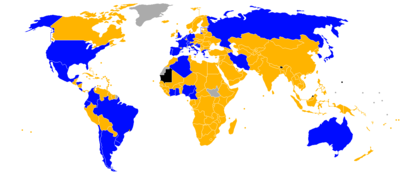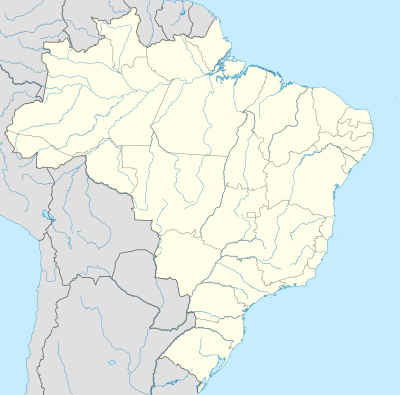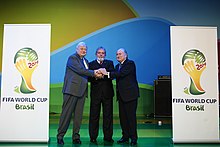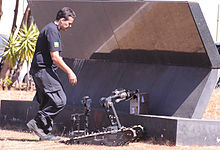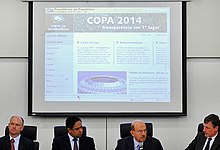| Copa do Mundo da FIFA Brasil 2014[1] | |
|---|---|
 2014 FIFA World Cup logo | |
| Tournament details | |
| Host country | Brazil |
| Dates | 12 June – 13 July (32 days) |
| Teams | 32 (from 5 or 6 confederations) |
| Venue(s) | 12 (in 12 host cities) |
← 2010 2018 → | |
Host selection
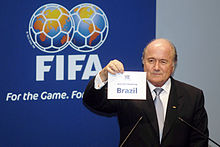
Sepp Blatter announcing the Brazilian hosting.
Main article: 2014 FIFA World Cup bids
On 7 March 2003, FIFA announced that the tournament would be held in South America for the first time since Argentina hosted the competition in 1978, in line with its policy of rotating the right to host the World Cup amongst different confederations. On 3 June 2003, the South American Football Confederation CONMEBOL announced that Argentina, Brazil, and Colombia wanted to host the 2014 World Cup finals.[4] By 17 March 2004, the CONMEBOL associations had voted unanimously to adopt Brazil as their sole candidate.[5]Brazil formally declared its candidacy in December 2006 and Colombia followed a few days later. The Argentina bid never materialized. On 11 April 2007, Colombia officially withdrew its bid, Francisco Santos Calderón the vice president of Colombia announced that instead Colombia would be hosting the 2011 FIFA U-20 World Cup. With this development, Brazil became the only official candidate to host the 2014 event.[6]
Brazil won the right to host the event on 30 October 2007 as the only country to enter the bidding process.[7]
Qualification
Main article: 2014 FIFA World Cup qualification
The allocation of places for the final tournament was decided on 3 March 2011, with the distribution of the 31 places determined through the qualification process unchanged from that for the 2010 World Cup.[8]Qualification draw
The qualification draw for the 2014 FIFA World Cup was held at the Marina da Glória in Rio de Janeiro on 30 July 2011.[9] [10] As the host nation, Brazil automatically qualifies for the tournament.Qualified teams
| Team | Order of qualification | Method of qualification | Date of qualification | Finals appearance | Last appearance | Previous best performance | FIFA Ranking at start of event |
|---|---|---|---|---|---|---|---|
| 1st | Host | 30 October 2007 | 20th | 2010 | Winners (1958, 1962, 1970, 1994, 2002) |
Europe (UEFA)
Main article: 2014 FIFA World Cup qualification (UEFA)
(53 teams competing for 13 berths)
South America (CONMEBOL)
Main article: 2014 FIFA World Cup qualification (CONMEBOL)
(9 teams competing for 4 or 5 berths, playoff to determine exact number)CONMEBOL will have 4 or 5 berths through qualification, with the top four teams in the group qualifying directly to the finals. The fifth place team from the group will play Asia's 5th place team in a home-and-away series to determine who will qualify.
In addition, Brazil automatically qualifies for the finals as host.
Africa (CAF)
Main article: 2014 FIFA World Cup qualification (CAF)
(52 teams competing for 5 berths)Asia (AFC)
Main article: 2014 FIFA World Cup qualification (AFC)
(43 teams competing for 4 or 5 berths, playoff to determine exact number)North and Central America and the Caribbean (CONCACAF)
Main article: 2014 FIFA World Cup qualification (CONCACAF)
(35 teams competing for 3 or 4 berths, with playoff to determine exact number) There are 3 certain berths that would be allocated to the first 3 places in the final group. The 4th place team in the final group will play Oceania's winner in a home and away series to determine who will qualify for the finals.Oceania (OFC)
Main article: 2014 FIFA World Cup qualification (OFC)
(11 teams competing for 0 or 1 berth, playoff to determine exact number) The winner of OFC will play the 4th team from CONCACAF in a home and away series.Organization
Date
The tournament will be held from 12 June to 13 July, weeks after the major European football leagues end their seasons, and during the winter of Brazil's subtropical region.Venues
Seventeen cities showed interest in being chosen as World Cup host cities: Belém, Belo Horizonte, Brasília, Campo Grande, Cuiabá, Curitiba, Florianópolis, Fortaleza, Goiânia, Manaus, Natal, Porto Alegre, Recife, Olinda (a stadium would be shared by both cities), Rio Branco, Rio de Janeiro, Salvador and São Paulo.[11] Maceió withdrew in January 2009.According to current FIFA practice, no more than one city may use two stadiums, and the number of host cities is limited between eight and ten. The Brazilian Football Confederation (CBF) requested permission to assign 12 cities hosting World Cup Finals.[12] On 26 December 2008, FIFA gave the green light to the 12-city plan.[13]
Even before the 12 host cities were selected, there were few doubts that the chosen venue for the final match will be the Maracanã in Rio de Janeiro, which also hosted the decisive match of the 1950 FIFA World Cup. Originally the CBF's intentions were to have the opening match at Estádio do Morumbi in São Paulo, the largest city in Brazil.
However, on 14 June 2010 the stadium was excluded from hosting games in the tournament due to a failure to provide financial guarantees for the improvements needed to have it as an eligible venue.[14] At the end of August 2010, the CBF announced that the Arena Corinthians would host the matches in São Paulo.
The 12 host cities for the 2014 World Cup were announced on 31 May 2009.[15] Belém, Campo Grande, Florianópolis, Goiânia and Rio Branco were rejected. Half of the chosen host cities will have their games in brand new venues built specifically for the World Cup, while the stadium for the capital Brasilia was demolished and will be rebuilt, and the remaining five are upgrading their current stadia.
| Rio de Janeiro | Brasília | São Paulo | Fortaleza |
|---|---|---|---|
| Estádio Mário Filho (Maracanã) | Estádio Nacional de Brasília (Mané Garrincha) | Arena Corinthians | Estádio Plácido Aderaldo Castelo (Castelão) |
| Capacity: 78,838[16] | Capacity: 70,064 (rebuilt) | Capacity: 65,807 (new stadium)[17] | Capacity: 63,903[18] |
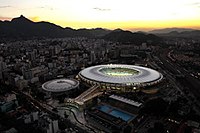 | 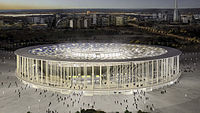 |  | 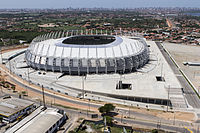 |
| Belo Horizonte | Porto Alegre | ||
| Estádio Governador Magalhães Pinto (Mineirão) | Estádio José Pinheiro Borda (Beira-Rio) | ||
| Capacity: 62,160 | Capacity: 48,849 (upgraded) | ||
 |  | ||
| Salvador | Recife | ||
| Arena Professor Octávio Mangabeira (Arena Fonte Nova) | Arena Pernambuco | ||
| Capacity: 56,500 | Capacity: 44,248 | ||
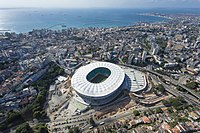 |  | ||
| Cuiabá | Manaus | Natal | Curitiba |
| Arena Pantanal | Vivaldo Lima (Arena Amazônia) | João Cláudio de Vasconcelos Machado (Arena das Dunas) | Estádio Joaquim Américo Guimarães (Arena da Baixada) |
| Capacity: 42,968 (rebuilt) | Capacity: 42,374 (rebuilt) | Capacity: 42,086 (rebuilt) | Capacity: 43,900 (upgraded) |
 | 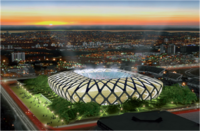 |  |  |
Climate of host cities
| City | Average daytime temperature of June, °C (°F) | Average daytime temperature of July, °C (°F) |
|---|---|---|
| Rio de Janeiro | 25.2 °C (77.4 °F) | 25.3 °C (77.5 °F) |
| Brasília | 25.2 °C (77.4 °F) | 20.1 °C (68.2 °F) |
| São Paulo | 21.7 °C (71.1 °F) | 20.8 °C (69.4 °F) |
| Fortaleza | 29.6 °C (85.3 °F) | 29.5 °C (85.1 °F) |
| Salvador | 26.5 °C (79.7 °F) | 26.2 °C (79.2 °F) |
| Recife | 28.8 °C (83.8 °F) | 27.3 °C (81.1 °F) |
| Porto Alegre | 19.4 °C (66.9 °F) | 16.7 °C (62.1 °F) |
| Belo Horizonte | 25.0 °C (77.0 °F) | 20.6 °C (69.1 °F) |
| Cuiabá | 31.0 °C (87.8 °F) | 32.0 °C (89.6 °F) |
| Manaus | 31.0 °C (87.8 °F) | 31.3 °C (88.3 °F) |
| Natal | 28.0 °C (82.4 °F) | 28.0 °C (82.4 °F) |
| Curitiba | 18.3 °C (64.9 °F) | 14.4 °C (57.9 °F) |
Final draw
The final draw for the 2014 World Cup will be held at Costa do Sauípe Resort, Mata de São João in Bahia on 6 December 2013,[19] at 13:00 local time (UTC−3).[20]Group stage
The match schedule was announced at FIFA's headquarters in Zurich, Switzerland on 20 October 2011.[21] On 27 September 2012 the FIFA Executive Committee announced the kickoff times of the matches, with the opening kickoff to be held on 12 June in São Paulo, at 17:00 local time. The group stage matches will be played at 13:00, 16:00, 17:00, 18:00, 19:00 and 21:00 local time, with knockout stage matches at 13.00 and 17.00 local time. The semi-finals will be played at 17:00 local time and the Final, on 13 July 2014 at the Maracana stadium, at 16:00 local time.[22]All times listed below are in Brasília official time (UTC−3). This is the time zone of ten of the twelve venues; the other two, Cuiabá and Manaus, are in the Amazon time zone (UTC−4), therefore for matches hosted at these two venues the local kickoff times are one hour earlier than the times listed below.[23]
Group A
| Team | Pld | W | D | L | GF | GA | GD | Pts |
|---|---|---|---|---|---|---|---|---|
| 0 | 0 | 0 | 0 | 0 | 0 | 0 | 0 | |
| A2 | 0 | 0 | 0 | 0 | 0 | 0 | 0 | 0 |
| A3 | 0 | 0 | 0 | 0 | 0 | 0 | 0 | 0 |
| A4 | 0 | 0 | 0 | 0 | 0 | 0 | 0 | 0 |
| 12 June 2014 17:00 | Brazil | Match 1 | Arena Corinthians, São Paulo | |
|---|---|---|---|---|
| 13 June 2014 13:00 | Match 2 | Arena das Dunas, Natal | ||
|---|---|---|---|---|
| 17 June 2014 16:00 | Brazil | Match 17 | Estádio Castelão, Fortaleza | |
|---|---|---|---|---|
| 18 June 2014 16:00 | Match 18 | Arena Amazônia, Manaus | ||
|---|---|---|---|---|
| 23 June 2014 17:00 | Match 33 | Estádio Mané Garrincha, Brasília | ||
|---|---|---|---|---|
| 23 June 2014 17:00 | Match 34 | Arena Pernambuco, Recife | ||
|---|---|---|---|---|
Group B
| Team | Pld | W | D | L | GF | GA | GD | Pts |
|---|---|---|---|---|---|---|---|---|
| B1 | 0 | 0 | 0 | 0 | 0 | 0 | 0 | 0 |
| B2 | 0 | 0 | 0 | 0 | 0 | 0 | 0 | 0 |
| B3 | 0 | 0 | 0 | 0 | 0 | 0 | 0 | 0 |
| B4 | 0 | 0 | 0 | 0 | 0 | 0 | 0 | 0 |
| 13 June 2014 16:00 | Match 3 | Arena Fonte Nova, Salvador | ||
|---|---|---|---|---|
| 13 June 2014 19:00 | Match 4 | Arena Pantanal, Cuiabá | ||
|---|---|---|---|---|
| 18 June 2014 19:00 | Match 19 | Estádio do Maracanã, Rio de Janeiro | ||
|---|---|---|---|---|
| 18 June 2014 13:00 | Match 20 | Estádio Beira-Rio, Porto Alegre | ||
|---|---|---|---|---|
| 23 June 2014 13:00 | Match 35 | Arena da Baixada, Curitiba | ||
|---|---|---|---|---|
| 23 June 2014 13:00 | Match 36 | Arena Corinthians, São Paulo | ||
|---|---|---|---|---|
Group C
| Team | Pld | W | D | L | GF | GA | GD | Pts |
|---|---|---|---|---|---|---|---|---|
| C1 | 0 | 0 | 0 | 0 | 0 | 0 | 0 | 0 |
| C2 | 0 | 0 | 0 | 0 | 0 | 0 | 0 | 0 |
| C3 | 0 | 0 | 0 | 0 | 0 | 0 | 0 | 0 |
| C4 | 0 | 0 | 0 | 0 | 0 | 0 | 0 | 0 |
| 14 June 2014 13:00 | Match 5 | Estádio Mineirão, Belo Horizonte | ||
|---|---|---|---|---|
| 14 June 2014 19:00 | Match 6 | Arena Pernambuco, Recife | ||
|---|---|---|---|---|
| 19 June 2014 13:00 | Match 21 | Estádio Mané Garrincha, Brasília | ||
|---|---|---|---|---|
| 19 June 2014 19:00 | Match 22 | Arena das Dunas, Natal | ||
|---|---|---|---|---|
| 24 June 2014 17:00 | Match 37 | Arena Pantanal, Cuiabá | ||
|---|---|---|---|---|
| 24 June 2014 17:00 | Match 38 | Estádio Castelão, Fortaleza | ||
|---|---|---|---|---|
Group D
| Team | Pld | W | D | L | GF | GA | GD | Pts |
|---|---|---|---|---|---|---|---|---|
| D1 | 0 | 0 | 0 | 0 | 0 | 0 | 0 | 0 |
| D2 | 0 | 0 | 0 | 0 | 0 | 0 | 0 | 0 |
| D3 | 0 | 0 | 0 | 0 | 0 | 0 | 0 | 0 |
| D4 | 0 | 0 | 0 | 0 | 0 | 0 | 0 | 0 |
| 14 June 2014 16:00 | Match 7 | Estádio Castelão, Fortaleza | ||
|---|---|---|---|---|
| 14 June 2014 22:00 | Match 8 | Arena Amazônia, Manaus | ||
|---|---|---|---|---|
| 19 June 2014 16:00 | Match 23 | Arena Corinthians, São Paulo | ||
|---|---|---|---|---|
| 20 June 2014 13:00 | Match 24 | Arena Pernambuco, Recife | ||
|---|---|---|---|---|
| 24 June 2014 13:00 | Match 39 | Arena das Dunas, Natal | ||
|---|---|---|---|---|
| 24 June 2014 13:00 | Match 40 | Estádio Mineirão, Belo Horizonte | ||
|---|---|---|---|---|
Group E
| Team | Pld | W | D | L | GF | GA | GD | Pts |
|---|---|---|---|---|---|---|---|---|
| E1 | 0 | 0 | 0 | 0 | 0 | 0 | 0 | 0 |
| E2 | 0 | 0 | 0 | 0 | 0 | 0 | 0 | 0 |
| E3 | 0 | 0 | 0 | 0 | 0 | 0 | 0 | 0 |
| E4 | 0 | 0 | 0 | 0 | 0 | 0 | 0 | 0 |
| 15 June 2014 13:00 | Match 9 | Estádio Mané Garrincha, Brasília | ||
|---|---|---|---|---|
| 15 June 2014 16:00 | Match 10 | Estádio Beira-Rio, Porto Alegre | ||
|---|---|---|---|---|
| 20 June 2014 16:00 | Match 25 | Arena Fonte Nova, Salvador | ||
|---|---|---|---|---|
| 20 June 2014 19:00 | Match 26 | Arena da Baixada, Curitiba | ||
|---|---|---|---|---|
| 25 June 2014 17:00 | Match 41 | Arena Amazônia, Manaus | ||
|---|---|---|---|---|
| 25 June 2014 17:00 | Match 42 | Estádio do Maracanã, Rio de Janeiro | ||
|---|---|---|---|---|
Group F
| Team | Pld | W | D | L | GF | GA | GD | Pts |
|---|---|---|---|---|---|---|---|---|
| F1 | 0 | 0 | 0 | 0 | 0 | 0 | 0 | 0 |
| F2 | 0 | 0 | 0 | 0 | 0 | 0 | 0 | 0 |
| F3 | 0 | 0 | 0 | 0 | 0 | 0 | 0 | 0 |
| F4 | 0 | 0 | 0 | 0 | 0 | 0 | 0 | 0 |
| 15 June 2014 19:00 | Match 11 | Estádio do Maracanã, Rio de Janeiro | ||
|---|---|---|---|---|
| 16 June 2014 16:00 | Match 12 | Arena da Baixada, Curitiba | ||
|---|---|---|---|---|
| 21 June 2014 13:00 | Match 27 | Estádio Mineirão, Belo Horizonte | ||
|---|---|---|---|---|
| 21 June 2014 19:00 | Match 28 | Arena Pantanal, Cuiabá | ||
|---|---|---|---|---|
| 25 June 2014 13:00 | Match 43 | Estádio Beira-Rio, Porto Alegre | ||
|---|---|---|---|---|
| 25 June 2014 13:00 | Match 44 | Arena Fonte Nova, Salvador | ||
|---|---|---|---|---|
Group G
| Team | Pld | W | D | L | GF | GA | GD | Pts |
|---|---|---|---|---|---|---|---|---|
| G1 | 0 | 0 | 0 | 0 | 0 | 0 | 0 | 0 |
| G2 | 0 | 0 | 0 | 0 | 0 | 0 | 0 | 0 |
| G3 | 0 | 0 | 0 | 0 | 0 | 0 | 0 | 0 |
| G4 | 0 | 0 | 0 | 0 | 0 | 0 | 0 | 0 |
| 16 June 2014 13:00 | Match 13 | Arena Fonte Nova, Salvador | ||
|---|---|---|---|---|
| 16 June 2014 19:00 | Match 14 | Arena das Dunas, Natal | ||
|---|---|---|---|---|
| 21 June 2014 16:00 | Match 29 | Estádio Castelão, Fortaleza | ||
|---|---|---|---|---|
| 22 June 2014 16:00 | Match 30 | Arena Amazônia, Manaus | ||
|---|---|---|---|---|
| 26 June 2014 13:00 | Match 45 | Arena Pernambuco, Recife | ||
|---|---|---|---|---|
| 26 June 2014 13:00 | Match 46 | Estádio Mané Garrincha, Brasília | ||
|---|---|---|---|---|
Group H
| Team | Pld | W | D | L | GF | GA | GD | Pts |
|---|---|---|---|---|---|---|---|---|
| H1 | 0 | 0 | 0 | 0 | 0 | 0 | 0 | 0 |
| H2 | 0 | 0 | 0 | 0 | 0 | 0 | 0 | 0 |
| H3 | 0 | 0 | 0 | 0 | 0 | 0 | 0 | 0 |
| H4 | 0 | 0 | 0 | 0 | 0 | 0 | 0 | 0 |
| 17 June 2014 13:00 | Match 15 | Estádio Mineirão, Belo Horizonte | ||
|---|---|---|---|---|
| 17 June 2014 19:00 | Match 16 | Arena Pantanal, Cuiabá | ||
|---|---|---|---|---|
| 22 June 2014 19:00 | Match 31 | Estádio do Maracanã, Rio de Janeiro | ||
|---|---|---|---|---|
| 22 June 2014 13:00 | Match 32 | Estádio Beira-Rio, Porto Alegre | ||
|---|---|---|---|---|
| 26 June 2014 17:00 | Match 47 | Arena Corinthians, São Paulo | ||
|---|---|---|---|---|
| 26 June 2014 17:00 | Match 48 | Arena da Baixada, Curitiba | ||
|---|---|---|---|---|
Knockout phase
| Round of 16 | Quarter-finals | Semi-finals | Final | |||||||||||
| 28 June – Belo Horizonte | ||||||||||||||
| Winner Group A | ||||||||||||||
| 4 July – Fortaleza | ||||||||||||||
| Runner-up Group B | ||||||||||||||
| Winner Match 49 | ||||||||||||||
| 28 June – Rio de Janeiro | ||||||||||||||
| Winner Match 50 | ||||||||||||||
| Winner Group C | ||||||||||||||
| 8 July – Belo Horizonte | ||||||||||||||
| Runner-up Group D | ||||||||||||||
| Winner Match 57 | ||||||||||||||
| 30 June – Brasília | ||||||||||||||
| Winner Match 58 | ||||||||||||||
| Winner Group E | ||||||||||||||
| 4 July – Rio de Janeiro | ||||||||||||||
| Runner-up Group F | ||||||||||||||
| Winner Match 53 | ||||||||||||||
| 30 June – Porto Alegre | ||||||||||||||
| Winner Match 54 | ||||||||||||||
| Winner Group G | ||||||||||||||
| 13 July – Rio de Janeiro | ||||||||||||||
| Runner-up Group H | ||||||||||||||
| Winner Match 61 | ||||||||||||||
| 29 June – Fortaleza | ||||||||||||||
| Winner Match 62 | ||||||||||||||
| Winner Group B | ||||||||||||||
| 5 July – Salvador | ||||||||||||||
| Runner-up Group A | ||||||||||||||
| Winner Match 51 | ||||||||||||||
| 29 June – Recife | ||||||||||||||
| Winner Match 52 | ||||||||||||||
| Winner Group D | ||||||||||||||
| 9 July – São Paulo | ||||||||||||||
| Runner-up Group C | ||||||||||||||
| Winner Match 59 | ||||||||||||||
| 1 July – São Paulo | ||||||||||||||
| Winner Match 60 | Third place | |||||||||||||
| Winner Group F | ||||||||||||||
| 5 July – Brasília | 12 July – Brasília | |||||||||||||
| Runner-up Group E | ||||||||||||||
| Winner Match 55 | Loser Match 61 | |||||||||||||
| 1 July – Salvador | ||||||||||||||
| Winner Match 56 | Loser Match 62 | |||||||||||||
| Winner Group H | ||||||||||||||
| Runner-up Group G | ||||||||||||||
Round of 16
| 28 June 2014 13:00 | Match 49 | Estádio Mineirão, Belo Horizonte | ||
|---|---|---|---|---|
| 28 June 2014 17:00 | Match 50 | Estádio do Maracanã, Rio de Janeiro | ||
|---|---|---|---|---|
| 29 June 2014 13:00 | Match 51 | Estádio Castelão, Fortaleza | ||
|---|---|---|---|---|
| 29 June 2014 17:00 | Match 52 | Arena Pernambuco, Recife | ||
|---|---|---|---|---|
| 30 June 2014 13:00 | Match 53 | Estádio Mané Garrincha, Brasília | ||
|---|---|---|---|---|
| 30 June 2014 17:00 | Match 54 | Estádio Beira-Rio, Porto Alegre | ||
|---|---|---|---|---|
| 1 July 2014 13:00 | Match 55 | Arena Corinthians, São Paulo | ||
|---|---|---|---|---|
| 1 July 2014 17:00 | Match 56 | Arena Fonte Nova, Salvador | ||
|---|---|---|---|---|
Quarter-finals
| 4 July 2014 17:00 | Match 57 | Estádio Castelão, Fortaleza | ||
|---|---|---|---|---|
| 4 July 2014 13:00 | Match 58 | Estádio do Maracanã, Rio de Janeiro | ||
|---|---|---|---|---|
| 5 July 2014 17:00 | Match 59 | Arena Fonte Nova, Salvador | ||
|---|---|---|---|---|
| 5 July 2014 13:00 | Match 60 | Estádio Mané Garrincha, Brasília | ||
|---|---|---|---|---|
Semi-finals
| 8 July 2014 17:00 | Match 61 | Estádio Mineirão, Belo Horizonte | ||
|---|---|---|---|---|
| 9 July 2014 17:00 | Match 62 | Arena Corinthians, São Paulo | ||
|---|---|---|---|---|
Third place match
| 12 July 2014 17:00 | Match 63 | Estádio Mané Garrincha, Brasília | ||
|---|---|---|---|---|
Final
| 13 July 2014 16:00 | Match 64 | Estádio do Maracanã, Rio de Janeiro | ||
|---|---|---|---|---|
Marketing
Logo [edit]
The logo is called "Inspiration", and was created by Brazilian agency Africa. The design stems from an iconic photograph of three victorious hands together raising the world's most famous trophy. As well as depicting the humanitarian notion of hands interlinking, the portrayal of the hands is also symbolic of the yellow and green of Brazil warmly welcoming the world to their country. The logo was unveiled at a ceremony held in Johannesburg on 8 July 2010.[24]FIFA and the Brazil LOC invited 25 Brazilian-based agencies to submit designs for the Official Emblem of the 2014 tournament and the task of picking the winner was awarded to a high-profile seven-strong judging panel consisting of CBF chairman Ricardo Teixeira, FIFA executive secretary Jérôme Valcke, supermodel Gisele Bündchen, architect Oscar Niemeyer, writer Paulo Coelho, singer Ivete Sangalo, and designer Hans Donner.[25]
Brazilian graphic designer Alexandre Wollner has criticized the design, suggesting that it resembles a hand covering a face in shame, as well as the process through which it was chosen, which had a jury that excluded professional graphic designers.[26]
Poster
The official poster was announced on 30 January 2013, by World Cup ambassadors Ronaldo, Bebeto, Zagallo, Amarildo, Carlos Alberto Torres, all of them World Champion footballers, and Marta, in a ceremony in Rio de Janeiro.[27][28]The artwork for this poster, which was created by Karen Haidinger,[29] designer from Brazilian agency Crama, features a map of the country made up from the outlines of football players' legs kicking a football.[30] In addition, the poster provides detailed drawing depicting the Brazilian culture and other features of the Brazilian nation such as the Brazil's fauna and flora.
The colorful poster represents the beauty and diversity of Brazil and, according to FIFA's General Secretary Jérôme Valcke, the artwork is a great example that Brazil is a capable and creative nation.[31]
Mascot
Main article: Fuleco
The tatu-bola, an armadillo that defends itself from predators by rolling up into a ball, was chosen as the official mascot by FIFA at a ceremony organized by LOC (Local Organizer Committee) on 11 September 2012.[32] The mascot was first introduced to the public during a segment of the news show Fantástico.[33] The name was chosen after a public voting process and announced during the show on 25 November.[34] 1.7 million people and more than 48 per cent voted for Fuleco, ahead of Zuzeco (31 per cent) and Amijubi (21 per cent), making it the unanimous winner. The mascot proved hugely popular within Brazil, with approximately 89 per cent Brazilians having seen the mascot and has been seen as a likeable character - he scores an average of 7.3 out of 10 on appeal.[35]"Fuleco" is a portmanteau of the words "Futebol" ("Football") and "Ecologia" ("Ecology") (also, nicknames finished with -eco are popular in Brazil). The other two proposed names were Amijubi ("Amizade" ("Friendship") and "Júbilo" ("Joy")) and Zuzeco ("Azul" ("blue") and "Ecologia" ("Ecology").[34]
Ball
Main article: Adidas Brazuca
The official ball of the 2014 World Cup will be the Adidas Brazuca. The name was selected by a public vote that received responses from more than 1 million Brazilian football fans; "Brazuca" received over 70 per cent of the vote.[36] Adidas, the official FIFA World Cup match ball supplier since 1970, took inspiration from elements of Brazilian culture to come up with a shortlist of three possible names for the ball that also included Bossa Nova and Carnavalesca.[36]Goal-line technology
This will be the first World Cup ever in which goal-line technology will be used after successful implementation in the 2012 FIFA Club World Cup in Japan. The aim is to use GLT in order to support the match officials and to install a system in all stadiums, pending the successful installation, and pre-match referee tests.[3][37][38][39][40]Infrastructure
Stadiums
The CBF estimates that the cost of construction and remodeling of stadiums[41] alone will be approximately over R$9.9 billion ($1.1 billion, £ 550 million).[42] In addition to the stadium upgrades and renovations, there will be millions more spent on basic infrastructure needs to get the country ready.When informed of the decision to host the tournament, CBF President Ricardo Teixeira said: "We are a civilized nation, a nation that is going through an excellent phase, and we have got everything prepared to receive adequately the honor to organize an excellent World Cup." Teixeira was on hand at FIFA's headquarters in Zürich when the announcement was made.[citation needed]
"Over the next few years we will have a consistent influx of investments. The 2014 World Cup will enable Brazil to have a modern infrastructure," Teixeira said. "In social terms will be very beneficial. Our objective is to make Brazil become more visible in global arenas," he added. "The World Cup goes far beyond a mere sporting event. It's going to be an interesting tool to promote social transformation."[43]
On 27 January 2013, the Castelão stadium, in Fortaleza, became the first 2014 World Cup stadium to host football matches after the finishing of its remodeling works. In the two matches, Fortaleza and Sport drew, 0-0 before Bahia beat Ceara, 1-0.[44] One week later, on 3 February 2013, Mineirão Stadium held its first match after the remodeling.[45] On 7 April 2013, the third venue for the FIFA World Cup was ready when the Arena Fonte Nova in Salvador, Bahia held its first match after being rebuilt, with Vitória beating Bahia 5-1.[46]
Airports
On 31 August 2009 the state airport management agency Infraero unveiled a R$ 5.3 billion (approx. €3 billion, £ 2 billion) investment plan[47] to upgrade airports of ten of the venue cities, increasing their capacity and comfort for the hundreds of thousands of tourists expected for the Cup. Natal and Salvador are excluded because their upgrade works have been recently completed. A significant amount (55.3%) of the money will be spent overhauling the airports of São Paulo and Rio de Janeiro. The investment figure covers works to be carried out up to 2014.The announcement by Infraero came in reply to criticism made by the Brazilian General Aviation Association, a grouping of private aircraft owners, that Brazil's airports currently could not cope with the World Cup inflow. The vice-president of the association, Adalberto Febeliano, told reporters that more than 500,000 football fans were expected, with each one taking between six and fourteen flights during the tournament to get to the games in various cities.[48] In May 2010, the Government of Brazil changed the bidding legislation to allow more flexibility to Infraero.[49]
Metro, Monorail, and Light rail

Light rail in Brasília.

View of São Paulo Metro.

Internal view of São Paulo Metro.
In 2014, the São Paulo International Airport will have a metro line that connects the airport with downtown São Paulo and the stadium. The new line integrates the São Paulo Metro and Greater São Paulo Metro.[51]
In 2014, the Salvador International Airport will have a metro line that connects the airport with downtown Salvador and the stadium. The new line integrates the Salvador Metro.[52]
In 2014, the Fortaleza International Airport will have a metro line that connects the airport with downtown Fortaleza and the stadium. The new line integrates the Fortaleza Metro.[53]
In 2014, the Manaus International Airport will have a monorail line that connects the airport with downtown Manaus and the stadium.[54]
In 2014, the Brasília International Airport would have a light rail line that connects the airport with downtown Brasília and the stadium. The new line integrates the Brasília Metro.[55] Due to fraud concerns before project start this line will not be ready for the World Cup and is out of the government official mobility projects.[56]
In 2014, the Cuiabá International Airport will have a light rail line that connects the airport with downtown Cuiabá and the stadium.[57] Last reports says this line may no be ready on time for the World Cup.[58]
In 2014, the Natal International Airport will have a light rail line that connects the airport with downtown Natal and the stadium.[59]
BRT

BRT in Curitiba, the pioneer in the world.
In 2014, the Curitiba International Airport will have a BRT line that connects the airport with downtown Curitiba and the stadium. The future BRT line of International Airport will add to the Rede Integrada de Transporte of Curitiba, one of the largest BRT systems of the world.
In 2014, the Recife International Airport will have a BRT line, that connects the airport with downtown Recife, metropolitan area, and the stadium. The BRT system will integrates the Recife Metro.
In 2014, the Rio de Janeiro International Airport will have a BRT line that connects the airport with Barra da Tijuca, a neighborhood in the West Zone of the city, which is the headquarters of 2016 Olympic Games. This will connect the BRT station in Barra da Tijuca with the South Zone (Copacabana, Ipanema, Leblon, etc.), the stadium, and the rest of the city is through the Rio de Janeiro Metro.
Development programme
The Brazilian federal government has earmarked R$ 3 billion (€ 1.8 billion, £ 1.1 billion) for investment in works relating to the 2014 World Cup, and intends to release a package of works, entitled the FIFA World Cup PAC (Portuguese acronym for Growth Acceleration Programme). According to the Brazilian minister of cities, Márcio Fortes, the bulk of funds should go to works pertaining to the tournament itself, but the total figure will only be defined after a meeting with representatives of the municipalities that will host the matches."This is only an initial figure. We have not set a figure yet. These R$3 billion will allow us to take the first step. The total value of projects is not known yet. We are going to hold talks with mayors to learn which projects are priorities," said the minister. The funds will be supplied by Pró-Transporte, a financing programme funded by the Severance Pay Indemnity Fund (FGTS) whose regulation was passed last year by the fund's Board of Curators.
According to Fortes, several city councils have already contacted the ministry and showed interest in partnership for carrying out infrastructure work turned exclusively to the Cup that will be held in Brazil. "For some time now, the city councils that will host the matches have been contacting us. The city councils have had meetings with FIFA and several projects were outlined. Our approach consists of dealing only with projects exclusively turned to the Cup. Our goal right now is not to solve transport-related issues in the city. We are going to help solve the issues pertaining to the events," he stated. According to the minister, another factor to be analysed by the Ministry of Cities is usefulness and sustainability of the investment after the competition is over. "We are not going to deal with huge projects. The cheapest and most efficient means of transport will be used. Of course, each case will be analysed separately," he explained.
Fortes stated that the PAC of the Cup is going to include partnerships with city councils and state governments, as well as some partnerships with the private sector. "The keyword is partnership. The federal government will not undertake anything by itself. It will be similar to the infrastructure PAC, in which we already have partnerships with city councils and state governments, as well as public-private partnerships. We are going to review the type of investment proposed, analyse their size, and the need for private sector participation, which may take place in different ways. The private sector may build and then lease the assets, or perhaps operate them. All of that will be discussed," he stated.
The minister also informed that preparations for the World Cup already include the creation of a line of financing for renewing the bus fleet across the country. The line will be made available by the Brazilian Federal Savings Bank with total funds of R$1 billion (€ 600 million, £ 375 million).[60]
Maracanã projects

Estádio Olímpico João Havelange, will host a training centre for teams in Rio de Janeiro.
The project may also provide for the restoration of Quinta da Boa Vista and the Museum of São Cristóvão, in addition to redevelopment and revitalization of neighborhoods including Tijuca. The Engenhão stadium, completed for the 2007 Pan American Games, has a capacity of 45,000 people and will serve as a training ground for the World Cup.
An investment of R$ 5 billion is required to meet the requirements that Rio de Janeiro faces in the final tournament and other games, covering three areas: logistics (roads, railways, ports, waterways and airports), energy (generation and transmission of electric power, petroleum, natural gas and renewables) and social and urban (light, sanitation, housing, subways and water resources). In relation to the Rio de Janeiro Metro, the Ministry of Transport has held a public hearing regarding the extension of its lines. The line for the new project is 13.5 km (8.4 mi) long, and should cross the South Zone of the city, carrying around 200,000 passengers per day between six metro stations.[61]
Corinthians projects
The New Corinthians Stadium, in the city of São Paulo, has been chosen for the opening ceremony. São Paulo's chances of staging the opening ceremony of the 2014 FIFA World Cup improved after FIFA accepted a guarantee that SC Corinthians Paulista's new stadium will be completed in time for the tournament. The stadium, being built by Odebrecht SA, will cost R$800 million (US$ 522 million), according to Corinthians President Andres Sanchez. BNDES, the national development bank, pledged R$ 400 million and the city of São Paulo will provide a property fund worth R$ 400 million.On a statement on the Corinthians website, Ricardo Teixeira, president of the World Cup local organising committee and the Brazilian Football Confederation, said: "This approval – in record time, less than a year – is the result of efforts by the government of São Paulo, particularly the Governor Geraldo Alckmin and Mayor Gilberto Kassab."[62] FIFA's approval of the project to build a new home for Brazil's biggest soccer club by revenue, which originally had a cost estimate of US$ 1.2 billion, was required for São Paulo to host World Cup games.
In June 2011, then sports minister Orlando Silva said in an interview that the federal government would tell tournament organizer FIFA that São Paulo, Salvador, Belo Horizonte and Brasília are eligible to stage the opening ceremony. FIFA will announce the venue in October. Sanchez said: "I said before that if Corinthians could fulfill all the requirements of FIFA, the opening of the World Cup would be in São Paulo. Corinthians gave the guarantees required by FIFA, so the opening will be in São Paulo."[62] Most of the funding for investment in airports, stadiums, ports and urban transportation before the World Cup will come from the government.[63]
Host cities

Colors of Brazilian Flag on Botanical Garden of Curitiba in 2010. A tribute was made between 16 and 23 September 2011, one thousand days to the World Cup, using the colours of the flags of each country that has won a prior championship: Brazil, Italy, Germany, Uruguay, Argentina, England, France and Spain.[64]
| Region | 1950 | 2014 | Host cities in 1950 | Host cities in 2014 |
|---|---|---|---|---|
| Central-West | 0 | 2 | — | Brasília, Cuiabá |
| North | 0 | 1 | — | Manaus |
| Northeast | 1 | 4 | Recife | Fortaleza, Natal, Salvador |
| South | 2 | 2 | Curitiba, Porto Alegre | |
| Southeast | 3 | 3 | Belo Horizonte, Rio de Janeiro, São Paulo | |
FIFA agreed to increase the number of host cities from ten to 12 because of the size of Brazil. "In the very beginning, ten cities were going to be chosen, but thanks to the influence of [CBF president] Ricardo Teixeira and the interest of the whole country, we agreed increasing the number to twelve," said FIFA president Sepp Blatter. Teixeira briefed FIFA members about all 17 candidate cities.[68]
A reported US$1 billion (approx. £650 million) is to be approved for the repair, upgrading and maintenance of Brazilian stadiums. However, aiming to build "state of the art" stadiums and, therefore, increasing their chances to be part of 2014's tournament, some Brazilian states are searching for expertise abroad. Recently delegations from Recife and Porto Alegre, for example, visited the Amsterdam Arena in order to understand the formula which made that stadium highly profitable. Amsterdam Arena, the home of AFC Ajax, has developed and is offering its expertise on the multi-use-purpose stadium concept and management. Amsterdam Arena has been developed to accommodate not only football matches but also concerts and events. Amsterdam Arena is currently developing two projects for Brazil: Recife/Olinda and Porto Alegre (Grêmio).[69]
Media
Filming
Sony had been selected as the general contractor responsible for the delivery of all outside broadcast. Sony will work with third party companies such Riedel for the intercom solutions, Lawo/ABS for the audio mixing consoles, EVS Broadcast Equipment for the mult-media servers and Gearhouse Broadcast for the TOCs. Included among others will be 340 HD cameras (of which 72 Supermotions), 48 switchers and 816 monitors.[70]Security plan

Anti-terrorism investment to 2014 FIFA World Cup.
A small camera fitted to the glasses can capture 400 facial images per second and send them to a central computer database storing up to 13 million faces. Minister Cardoso said the government is developing a public safety plan that will be unveiled "soon."[71]
Secretary José Ricardo Botelho is facing perhaps the most important mission of his life as a civil servant. Heading the newly created Special Secretariat for the Security of Large Events, Botelho has the task of ensuring the safety of Brazilians and tourists during the 2014 FIFA World Cup. To this end, he has developed what might be called an obsession: to integrate the security forces of a country with continental dimensions like Brazil. To prove that the goal will be achieved, he draws on History, his other obsession: "People who have a history know where they want to go."
Integration is the keyword in the Strategic Security Plan prepared for the 2014 FIFA World Cup. In addition to ensuring quick responses, the plan provides for an integrated security system that can be left as a legacy to the country. In total, an estimated 45,000 men linked to the security forces will be mobilized, not to mention reinforcements from the Brazilian Armed Forces and Civil Defense. "The country does not need to create anything new, but just to integrate its existing tools," he said. According to José Ricardo Botelho, the databases of federal and state security forces will be integrated with the Interpol database, which means connecting Brazil to 188 countries. In addition, the government has already sent documents to the United States, Germany, England, Holland, South Africa, Poland and Argentina requesting information about terrorists, "troublemakers" and hooligans.
"We want to work proactively rather than defensively; hence the importance of technology. We are linking everything so that when a person fitting this profile applies for a visa, for example, we will already have the first barrier in place. But in the case of a country for which an entry visa is not required, when the person gets to our borders he or she will not be allowed into Brazil. But what if he or she does? We are working with state-of-the-art equipment to identify these people. We do not want them among us," says the commissioner. Technology pervades all discussions of the Security Plan for the World Cup. Teams from the Special Secretariat for the Security of Large Events are visiting the 12 host cities to follow civil works in the stadiums that will be hosting World Cup games. Anti-bomb groups are monitoring the works up to delivery, in order to ensure that no artifacts are hidden inside pillars and foundations.
In addition to security in the stadiums, the Secretariat for the Security of Large Events is keeping a close eye on fan fests. Each host city will have an operational command center with representatives of the police, the Armed Forces, the Fire Department and Civil Defense. There, decision-making promises to be quick. The central command headquarters will be located in Brasília and Rio de Janeiro.[72]
Brazil is training of 53,000 public safety professionals for the 2014 FIFA World Cup. The professionals will be made by the state governments for each individual games venue. They will be trained in three categories: experts, multipliers (who will help to transfer knowledge to other professionals) and operators. The training courses will include "Public safety without homophobia", application of human rights in policing, Brazilian Sign Language and foreign languages.[73]
Anti-fraud plan
On 11 June 2010, the federal government launched a program to protect the tenders for work in preparation for the 2014 World Cup and the 2016 Olympic Games against the possibility of fraud. The plan, known as Jogando Limpo (Fair Play), includes a series of guidelines and nuggets of advice so that the government institutions, and also the tax authorities and common citizens themselves, may identify and denounce attempts at fraud against the tenders. The program, which was launched by the Ministries for Justice and for Sport, also plans the establishment of a group dedicating to monitoring tenders, to protect them against the threat of fraud and also to avoid delays in construction work.This initiative, also boosted by the General Financial Controller of the Union (Controladoria Geral da União), also plans a campaign to make the people aware of the need to pay attention to possible fraud and to always denounce the cases. The program emphasizes measures against cartels and possible agreements between competing companies to set prices above market levels, in an attempt to raise the value of the contracts with the state. "Nothing can be worse than someone taking advantage of these two great opportunities to commit crimes. This is a world phenomenon," said the Minister for Justice, Luiz Paulo Barreto, during the ceremony to launch the program.
"The businesspeople could be entering with an agreement on prices, in order to compete in these tenders. This is something that needs to be tackled. We need to promote fair play also in our tenders," Barreto added. "Fair play is something we would expect from a country intending to host events of this size," he added. Barreto also said that, between 2007 and 2010, there were a total of 265 search and seizure warrants issued in Brazil to tackle the crime of cartel formation. In the same period over 100 people were preventively arrested for the same crime, and currently an additional 251 people are being investigated.[74]
Tax breaks

New Estádio Nacional Mané Garrincha under construction as of August 2012.
In addition, the 12 cities that shall be hosting the World Cup matches shall be able to grant exemption from State Value Added Tax (Imposto sobre Circulação de Mercadorias e Serviços – ICMS) on all operations involving merchandise and other goods for the construction or the refurbishment of the stadiums. "Conditional on the cumulative concession of the benefits involving Importation Tax, IPI and PIS/COFINS, the exemption of ICMS on imports shall only be applicable if the goods do not have a similar product produced nationally," the note informed, adding that this decision shall be made feasible through a Law or Provisional Measure.
In September 2009, the Brazilian Development Bank (Banco Nacional de Desenvolvimento Econômico e Social – BNDES) opened a credit line of R$ 4.8 billion (approx. €2.7 billion, £ 1.75 billion) for the World Cup stadiums. Each host city shall be able to finance up to R$ 400 million (approx. €225 million, £ 145 million) or 75% of the project, with bank funds.[75]
See also
- 2013 FIFA Confederations Cup
- Rio 2 - An upcoming computer-animated film. Set for release three or four months before the 2014 FIFA World Cup occurs, the event may tie into the film.[76]
- The Official Album of the 2014 FIFA World Cup
References
- ^ The Portuguese pronunciation is [ˈkɔpɐ du ˈmũdu dɐ ˈfifɐ bɾɐˈziw ˈdojz ˈmiw i kɐˈtoʁzi], in Brazil's standard pronunciation.
- ^ "Pot allocations for the Preliminary Draw". FIFA. 27 July 2011. Retrieved 28 July 2011.
- ^ a b FIFA launch GLT tender for Brazil 2013/14 FIFA.com. Retrieved 19 February 2013
- ^ "Argentina, Brazil and Colombia want 2014 World Cup". People's Daily. 19 January 2003. Retrieved 9 October 2011.
- ^ Blatter reiterates wish that the 2014 World Cup be in Brazil[dead link]
- ^ "Brazil confirms bid – Colombia withdraws". Fifa.com. Retrieved 9 October 2011.
- ^ "Brazil confirmed as 2014 hosts". FIFA. 30 October 2007. Archived from the original on 31 October 2007. Retrieved 30 October 2007.
- ^ FIFA.com – Financial report presented, Brazil 2014 slots & host countries decided[dead link]
- ^ "Rio draw pits Spain against France". FIFA.com. 30 July 2011. Retrieved 28 March 2013.
- ^ "Draw for World Cup qualifiers at Marina da Glória in Rio" (in Portuguese). globoesporte.com. 8 December 2010. Retrieved 21 January 2011.
- ^ "FIFA's Inspection Report" (PDF). Retrieved 9 October 2011.
- ^ "FIFA wants to decide which cities will house World Cup 2014", Sportsya[dead link]
- ^ "Mondiali 2014 in dodici città" (in Italian). Tuttomercatoweb.
- ^ "Sao Paulo dropped for 2014". SBS. 17 June 2010. Archived from the original on 28 June 2010. Retrieved 17 June 2010.
- ^ "Host Cities for Brazil 2014 to be announced in May". FIFA.com (Fédération Internationale de Football Association). 12 March 2009. Retrieved 6 June 2009.[dead link]
- ^ "Cadeiras sao retiradas do Maracanã para conclusao da primeira etapa das obras pra a Copa do Mundo – Chairs are removed from Maracanã concluding the upgrading first step". Noticias.r7.com. 6 January 1990. Retrieved 9 October 2011.
- ^ "Brazil 2014" (in Brazilian Portuguese). esportes.terra.com.br. 30 May 2011. Retrieved 7 June 2011.
- ^ http://copa2014.gov.br/pt-br/arena/fortaleza
- ^ "Key issues addressed at Brasilia meeting". fifa.com. 28 June 2012.
- ^ "Organising Committee for the FIFA World Cup extends its responsibilities to cover 2018 and 2022". fifa.com. 19 March 2013.
- ^ "Match schedule for 2014 FIFA World Cup™ unveiled". fifa.com. 20 October 2011.
- ^ "FIFA Executive Committee approves kick-off times for Brazil 2014". fifa.com. 27 September 2012.
- ^ "Match schedule for 2014 FIFA World Cup™". fifa.com. 22 April 2013.
- ^ "Journey to Brazil 2014 begins". FIFA.com. Archived from the original on 11 July 2010. Retrieved 11 July 2010.[dead link]
- ^ Shanahan, Mark; Goldstein, Meredith (10 July 2010). "Gisele picks logo, shops with Tom – The Boston Globe". Boston Globe. Archived from the original on 11 July 2010. Retrieved 11 July 2010.
- ^ "Designer critica logo da Copa 2014: "É uma porcaria" – Terra – Esportes". Terramagazine.terra.com.br. Archived from the original on 12 July 2010. Retrieved 11 July 2010.
- ^ "EMBAIXADORES DA COPA DO MUNDO DA FIFA 2014 APRESENTAM CARTAZ OFICIAL" (in Portuguese). Retrieved 30 January 2013.
- ^ "2014 Ambassadors unveil Official Poster". FIFA.com. 30 January 2013. Retrieved 28 March 2013.
- ^ "PÔSTER OFICIAL DA COPA" (in Portuguese). Retrieved 30 January 2013.[unreliable source?]
- ^ "Brazil’s World Cup poster is the nuts". FIFA. 30 January 2013. Retrieved 13 February 2013.
- ^ "FIFA releases official poster of World Cup 2014 in Brazil". Retrieved 31 January 2013.
- ^ "Fifa registra desenho e confirma tatu-bola como mascote da Copa" (in Portuguese). Globoesporte.com. 11 September 2012. Retrieved 11 September 2012.
- ^ "2014 Mascot is big in Brazil".
- ^ a b "Fuleco é escolhido como nome do mascote da Copa de 2014". UOL Esporte (in Portuguese) (São Paulo). 26 November 2012. Retrieved 26 November 2012.
- ^ "Fuleco wins name game". Fifa.com. 26 November 2012. Retrieved 1 December 2012.
- ^ a b "adidas Brazuca – Name of Official Match Ball decided by Brazilian fans". FIFA.com (Fédération Internationale de Football Association). 2 September 2012. Retrieved 3 September 2012.
- ^ Valcke: GLT is a kind of revolution FIFA.com. Retrieved 19 February 2013
- ^ FIFA says goal-line technology will be used at 2014 World Cup NDTVSports. Retrieved 19 February 2013
- ^ FIFA confirms goal-line technology in World Cup Times of India. Retrieved 19 February 2013
- ^ FIFA to use goal-line technology Sports.Yahoo.com. Retrieved 19 February 2013
- ^ All Stadiums for Brazil 2014 World Cup[dead link]
- ^ "Brazil Named as World Cup 2014 Host". Brazil.homesgofast.com. Retrieved 9 October 2011.
- ^ "Brazil, only candidate, to host 2014 World Cup". ESPN. 30 October 2007. Retrieved 17 April 2013.
- ^ "Brazil's first 2014 World Cup stadium holds matches". NewVision. 28 January 2013. Retrieved 30 January 2013.
- ^ "Falhas operacionais do Mineirão começam a ser investigadas pelo Ministério Público" (in Portuguese). UOL. 4 February 2013.
- ^ "Em estreia da Fonte Nova, Vitória goleia e estraga festa do Bahia" (in Portuguese). Terra Brasil. 7 April 2013.
- ^ Rittner, Daniel; Braga, Paulo Victor (31 August 2009). "Infraero vai gastar R$5 bi em reforma de aeroportos". Valor Econômico (in Portuguese). pp. A4.
- ^ "Future airports of Brazil". Asiaone.com. Retrieved 9 October 2011.
- ^ "Law reduces bureaucracy". V-brazil.com. 8 June 2010. Retrieved 9 October 2011.
- ^ "Copa 2014: Aeromóvel de Porto Alegre começa a sair do papel" (in Portuguese). Portal 2014. 22 July 2011. Retrieved 15 October 2011.
- ^ "Secretário diz que abertura da Copa pode render R$ 30 bi a São Paulo" (in Portuguese). Portal 2014. 28 September 2011. Retrieved 12 October 2011.
- ^ "Edital para ampliação do metrô de Salvador deve sair em 45 dias" (in Portuguese). Portal 2014. 18 August 2011. Retrieved 12 October 2011.
- ^ "Copa do Mundo deixará legado para o futuro". O POVO Online. Retrieved 13 October 2011.
- ^ "Obra do monotrilho de Manaus é aprovada". Portal 2014. 15 October 2011. Retrieved 4 August 2011.
- ^ "Metrô Leve de Brasília – VLT" (in Portuguese). GDF Portal do Cidadão. 2009. Retrieved 12 October 2011.
- ^ "VLT linha 1-trecho 1 (Aeroporto/Terminal Asa Sul)" (in Portuguese). Retrieved 5 October 2012.
- ^ "Governo aceita VLT em Cuiabá e metrô em Salvador" (in Portuguese). Portal 2014. 9 September 2011. Retrieved 13 October 2011.
- ^ "VLT Cuiabá/Várzea Grande" (in Portuguese). Retrieved 5 October 2012.
- ^ "Fátima Bezerra diz que VLT está garantido com a Copa 2014" (in Portuguese). Nominuto.com. 3 June 2009. Retrieved 16 October 2011.
- ^ "Brazil-Arab news Agency – World Cup". .anba.com.br. Retrieved 9 October 2011.
- ^ nosso time. "Rio and the final match of 2014 FIFA World Cup". Copa2014.org.br. Retrieved 9 October 2011.
- ^ a b "Sao Paulo Hopes of Hosting 2014 FIFA World Cup Opening Ceremony Boosted". Sportconnect. 14 July 2011. Retrieved 22 October 2011.
- ^ website group (14 July 2011). "Sao Paulo Hopes of Hosting 2014 FIFA World Cup Opening Ceremony Boosted". Sportconnect. Retrieved 22 October 2011.
- ^ "Jardim Botânico, em Curitiba, recebe iluminação alusiva aos mil dias para Copa" (in Portuguese). UOL. Retrieved 1 April 2012.
- ^ dom, 31 May 2009. "Host cities in 1950 FIFA World Cup". Colunas.globoesporte.com. Retrieved 9 October 2011.
- ^ Selection – Regions of Brazil[dead link]
- ^ "Winter in Brazil during the FIFA World Cup". Brcactaceae.org. Retrieved 9 October 2011.
- ^ "Host cities – World Cup". BBC News. 31 May 2009. Retrieved 9 October 2011.
- ^ "Brazil Insight – Dutch and English website". Brazilinsight.nl. Retrieved 9 October 2011.
- ^ "Sony Professional awarded 2014 FIFA World Cup™ Broadcast Production Contract"
- ^ Steven McLoud (13 October 2011). "Brazil Guarantees Efficient Security Plan for 2014 FIFA World Cup". Diálogo. Retrieved 21 October 2011.
- ^ our team. "ntegration is the keyword in the Strategic Security Plan". World Cup Portal. Retrieved 21 October 2011.
- ^ Brazilian police without homophobia (Portuguese)
- ^ our team. "Anto-fraud plan in Brazil". Copa2014.org.br. Retrieved 9 October 2011.
- ^ "Brazil shall grant tax breaks for 2014 stadiums". Portal 2014. 18 May 2010. Retrieved 30 October 2007.
- ^ Collis, Clark (25 January 2012). "Sergio Mendes says a 'Rio' sequel 'looks like it's going to happen'". Inside Movies. Retrieved 12 March 2012.
External links
| Wikimedia Commons has media related to: 2014 FIFA World Cup |
| ||
| ||
| |||
| |||
| ||
You have read this article with the title ROAD TO SOCCER WORLD CUP: 2014 FIFA World Cup by The World of Soccer and World Cup Radio Network. You can bookmark this page URL http://gaytunisia-to-da-ri.blogspot.com/2013/05/road-to-soccer-world-cup-2014-fifa.html. Thanks!


